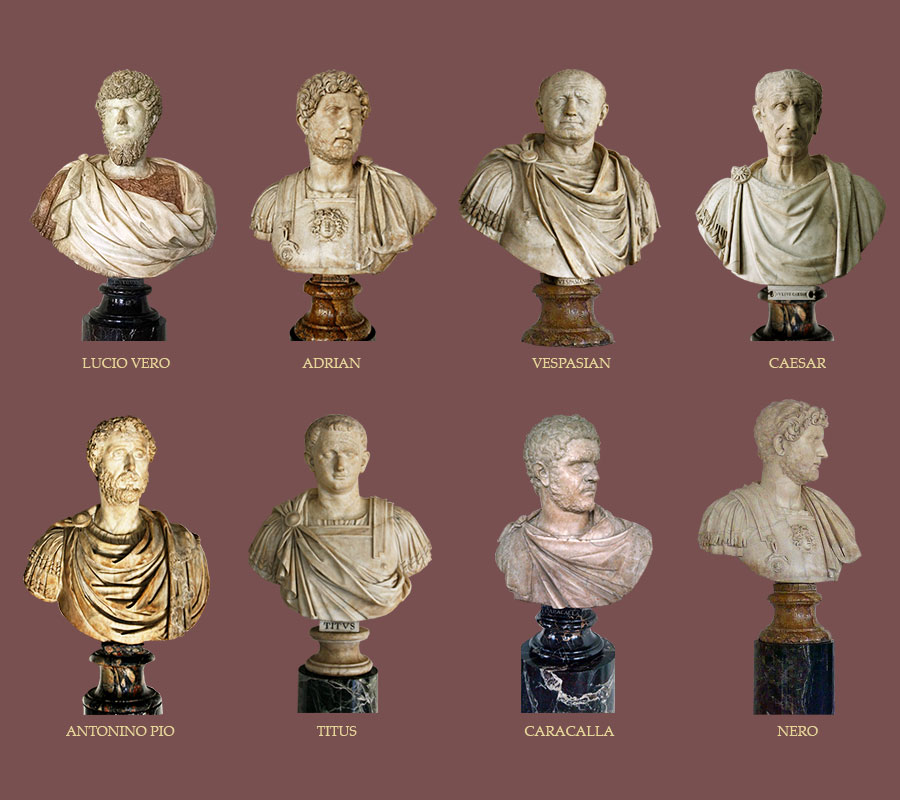Below, a translated passage from the first volume of Karlheinz
Deschner’s Kriminalgeschichte des Christentums
(“Criminal History of Christianity”)
The Jewish religion, tolerated by the pagan state
But even the masters of Rome were tolerant of the Jews (in whom they found peasants, artisans, workers—at that time they were not yet characterised as merchants), and in some cases showed some sympathy for them. They enjoyed some special privileges, especially in the East, such as Sabbath observance. They had their own jurisdiction and were not obliged to submit to Roman jurisdiction.
Caesar supported them in many ways. Augustus generously endowed the Temple of Jerusalem. According to the terms of the imperial donation, a bull and two lambs were sacrificed there every day “to the highest God.” Agrippa, an intimate friend of Augustus, also favoured the Jews.
On the other hand, Emperor Caligula (37-41)—somewhat eccentric and aspiring to have his own temple, appeared in public clothed with the attributes of various divinities, even female, and lived married to his sister Drusilla and intended that an image of him be erected even in the Holy of Holies of Jerusalem—expelled the Jews of the main cities of Parthia, where they were especially numerous.
But even the emperor Claudius, before persecuting the Jews of Rome, had issued a decree in their favour, in the year 42, granting them a special jurisdiction valid throughout the empire, but at the same time warned them not to abuse imperial magnanimity and that they did not despise the customs of other peoples. Nero’s wife, Poppaea Sabina, was a great protector of Judaism. In general terms, the Roman administration was always ready “to accommodate as much as possible, and even more, with all the demands of the Jews, justified or not” (Mommsen).
Not even after the conquest of Jerusalem did the emperors harass the Jewish faith, which for them was religio licita. Vespasian and his successors corroborated the privileges already granted by Caesar and Augustus. Jews could marry, sign contracts, acquire property, hold public office, possess slaves, and many other things, like any Roman citizen. Jewish communities could manage their own goods and had their own, albeit limited, jurisdiction.
Even after Bar Kokhba’s insurrection, Emperor Hadrian and his successors consented to the public celebration of Jewish cults, and granted the dispensation of common obligations which were incompatible with their religion. Even in the provinces there were almost no restrictions against them; they built synagogues, appointed their trustees, and were exempt from military service in accordance with their beliefs.
And all this because, just as today the primitive peoples do not know, in their beliefs, the claim of exclusiveness of a “superior being,” also the old Hellenism was characteristically tolerant. In polytheism, no deity can claim the exclusive. The native cults amalgamated without problems with the imported ones. In the ancient pantheon prevailed a kind of collegiality or friendly companionship; the faithful could pray to the god they preferred, believed to recognize their own gods under the appearances of others, and certainly did not bother trying to “convert” anyone. Schopenhauer says that intolerance is an essential characteristic of monotheism, that only the one God is
by its nature, a jealous god, that does not want to consent the subsistence of any other. On the other hand, the gods of polytheism are by nature tolerant; Live and let live, and in principle tolerate their colleagues, the gods of the same religion. Later on, that tolerance extends equally to foreign deities.
To the pagans, the belief in a unique God seems to them a poverty of concepts; uniformity, un-sacralisation of the universe, atheism. Nothing more foreign to their way of thinking than the idea that the foreigners’ gods are idols. Nothing sounds to them as incomprehensible as the “thou shalt have no other God but Me” of the Jews; “I am the Lord,” “I am the Lord your God,” an expression that is repeated up to sixteen times in the 19th chapter of Leviticus, to give but one example and not the longest. Paganism knows nothing comparable to the covenant of blood between Yahweh and his “chosen people.” And nothing excited more the antipathy against the Jews than their behaviour on account of their beliefs.

One reply on “Kriminalgeschichte, 9”
Thanks for making this translation available.
It’s possible Caligula was really an eccentric. But given his lineage!!, the depths of historical falsification, and the people’s love for gossip, sensational aims, and the wildest accusations (i.e. like those around Cagliostro), I don’t think he was as bad as he is depicted. If it weren’t for a certain Paul, Jesus would be known as “a glutton and a drunkard” who made “friends with tax collectors” and who was considered the “son of a whore”.
It’s possible that he was a racially conscious anti-Semite. According to Orosius, in his time, the Jews were killed in a riot in Alexandria and expelled and Philo was sent as an envoy to Caligula, and it was ignored. We are told that Caligula especially hated the Jews and instead, he took a similar approach as Antiochus Epiphanes did.